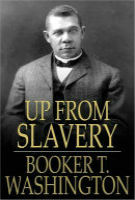 “Ignorant and inexperienced, it is not strange that in the first years of our new life (after slavery) we began at the top instead of at the bottom; that a seat in Congress or the state legislature was more sought than real estate or industrial skill… No race can prosper till it learns that there is as much dignity in tilling a field as in writing a poem. It is at the bottom of life we must begin, and not at the top.” –from Up From Slavery
“Ignorant and inexperienced, it is not strange that in the first years of our new life (after slavery) we began at the top instead of at the bottom; that a seat in Congress or the state legislature was more sought than real estate or industrial skill… No race can prosper till it learns that there is as much dignity in tilling a field as in writing a poem. It is at the bottom of life we must begin, and not at the top.” –from Up From Slavery
When Booker T. Washington published in 1901 his classic autobiography, Up From Slavery, he was at the threshold of his greatest power and influence as the premier spokeman for Black Americans in the segregation era. Later that year, President Roosevelt invited Washington to dinner at the White House, ushering in an era in which Washington was not only the adviser of Presidents but the acceptable Black sage, the almoner of philanthropists and the boss of Black America. However, Booker T. Washington walked a dangerous middle ground in a time of racial backlash and disfranchisement: as he publicly acquiesced to whites on issues of social equality, he fiercely exhorted Blacks, through his national political machine to untie and improve their lot.
Though Washington worked ceaselessly through many channels to gain moral and financial support for his people and his beloved Tuskegee Institute, Up From Slavery, his autobiography helped him at these endeavors more than all the other efforts combined. Vividly recounting Washington’s life – his childhood as a slave, his struggle for education, his founding and presidency of the Tuskegee Institute, his meetings with the country’s leaders, Up From Slavery reveals the conviction he held that the Black man’s salvation lay in education, industriousness, and self reliance.
Review: Up from Slavery
“Washington’s Up From Slavery, is celebrated as a classic American autobiography. The story of one man’s success, Up From Slavery…has been described as presenting an unrealistically optimistic picture of Black life in post Civil War America. Washington does not focus on the institution of slavery, from which he escaped but on the educational institutions that shaped his life and his work with the Tuskegee Institute, which he helped found. Washington begins his story with an explanation of his birth and upbringing, revealing that he was born into slavery in Franklin County, Virginia, but soon moves to his learning experiences. Throughout the work he stress his belief that concrete educational training is of greater value than purely theoretical intellectual accomplishments. Washington concludes his autobiography in 1896, when he received an honorary degree from Harvard University. -Roger M. Valade, The Essential Black Literature Guide.
Submit your review | |


